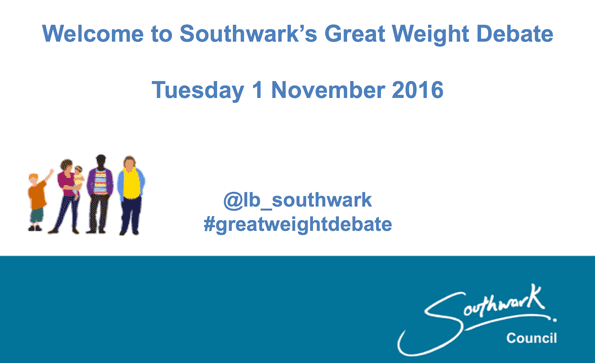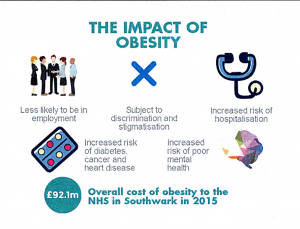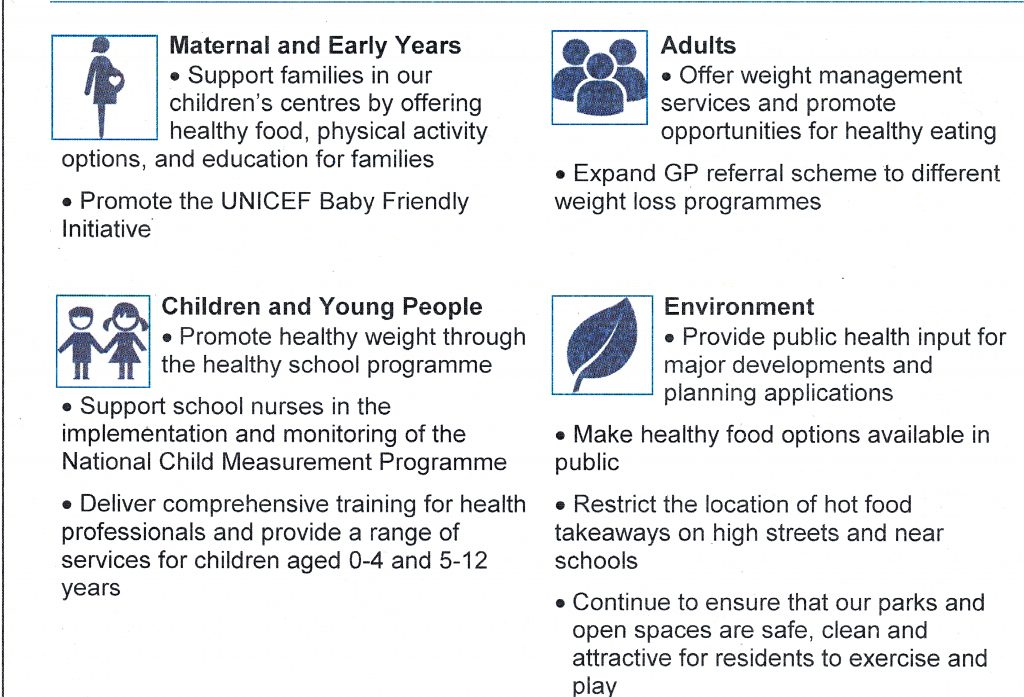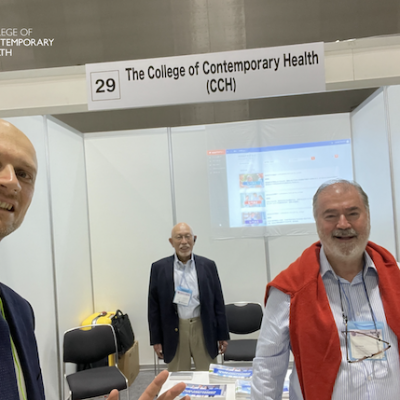
CCH attend Southwark’s Great Weight Debate
On Tuesday 01 November 2016, The College of Contemporary Health attended the Great Weight Debate hosted by Southwark Council at Cambridge House.
Paul Stokes, Head of Southwark Public Health, opened the busy meeting by introducing its ultimate goal: to engage with stakeholders and the public in order to find new approaches to tackle obesity. Southwark council, as revealed by Councillor Maisie Anderson, has some of the highest rates of overweight and obesity in the UK. 56% of adults and 46% of children in the borough are either overweight or obese. These percentages put the borough at the top of the UK obesity league tables. The impact of obesity in the borough is devastating.
Therefore, the council has endeavoured to develop a comprehensive ‘Healthy Weight Strategy’ aiming to significantly reduce levels of overweight and obesity by 2020.
Russel Carter, a consultant in Public Health, introduced the strategy, which is focussed on prevention and relies on four key principles:
- Life-course but prioritising children and early years
- Family focused
- Whole systems approach
- Prevention and treatment
He reinforced that the strategy should be everybody’s business and that the main objective of this meeting was to discuss the strategy with the various stakeholders and get people engaged and involved.
The strategy is split into the following four parts.
The remainder of the meeting was filled with talks describing examples of some of the current initiatives that implement the measures above.
Sue Amos introduced the benefits of gardening; Sue started the Burgess Park Food Project to work with the local community to increase understanding of healthy fresh food, promote food growing and bring people together. Many studies have shown the positive effects of gardening on people’s health and BMI. In fact, the World Cancer Research Fund suggests that people who engage in 30 minutes of gard ening can burn up to 145 calories.
ening can burn up to 145 calories.
Lee Souter discussed the Healthy Schools Partnership initiative. Lee started his talk by engaging the audience with a lively debate on whether girls or boys were better at sport. The audience concluded that there wasn’t a simple answer and that it depended on a variety of factors.
The program aims to invest in educating children in their formative years to prevent suffering, reduce inequality, create healthy and productive adults, and deliver social and economic dividends to the nation. So far there have been numerous achievements including Comber Grove school (Silver Healthy School) and Robert Browning school (Gold Healthy School).
The next talk was by Jane Love who introduced, the UNICEF baby friendly initiative. The initiative supports mothers to be able to initiate and sustain exclusive breastfeeding for 6 months and ensure the timely introduction of adequate, and safe, complementary foods with continued breast feeding of up to two years or beyond. But why does breastfeeding matter? According to, Jane Love, it saves lives, improves health, cuts costs and is associated with a 13% reduction in obesity.
Finally, Dr Zoe Williams spoke about how obesity does not affect all groups equally and went on to discuss what is available in Southwark for obesity prevention and management. There are a number of Tier 2 services and a Tier 3 service is in development. Southwark does also have access to two hospitals that offer bariatric surgery (Tier 4).
In fact, Southwark is the first borough in South East London to be creating a Tier 3 Service. The service will apply a multidisciplinary, clinically led team approach including: nutrition, physical activity and psychological components.
A study done on Southwark patients, or service users, as they preferred to be called, revealed that patients thought that there was a great need for NHS weight management services, and that they were often put off by commercial weight loss programs. They praised the fact that everything would be under one roof and were keen for a self-referral option.
Finally, as part of getting everyone involved, there were two workshops for the attendees where they were asked what else could be done to strengthen the strategy. The main take home messages from these workshops were, that since obesity is strongly linked to inequalities, a targeted approach to those suffering inequalities, and the need for training of healthcare professionals, was echoed across the room.
The Great Weight Debate is a Healthy London Partnership initiative and everyone can be involved.
Please visit their website and spend 2 minutes completing a survey on Childhood Obesity.







I am delighted to have received information about this event – albeit two days after it took place. Evolve are at the front of innovative interventions in schools to bring about gains for Health and Wellbeing among staff and pupils.
How can we contribute to what has been discussed? I am certain we can add some positive disruption to the thinking and discussions that took place. Our work has been impact measured extensively by independent organisations (Leeds Beckett University – commissioned by Bradford Public Health, and LKMco Ltd).
We would love to be part of this group going forward.
Hello Graham, thank you for your comment! The best way to get involved would be to contact Southwark Council and ask them to provide information on how to join.